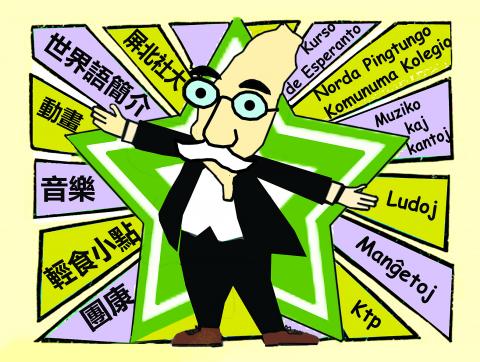French expat Cyril Vergnaud lives in Pingtung and speaks French, Chinese, Hoklo (more commonly known as Taiwanese) and English. He also speaks Esperanto.
Tomorrow, Vergnaud and students of Esperanto from Pingtung Community College will hold the Esperanto Festival (屏北社大世界語學員), an annual event that is open to the public. There will be a NT$100 door charge to cover drinks, snacks and a gift bag for everyone who attends, he said.
Esperanto is a language devised to enable communication among the world’s different language speakers. Vergnaud told the Taipei Times by e-mail that he became interested in learning the language purely by chance.

Photo courtesy of Pingtung Esperanto Festival
“I first met two Esperantists who live and work in Pingtung,” he said. “One guy, Reza Kheir-khah, is from Iran and a woman New Zealand, Simone Roberts, is also in our group here. While I had never studied Esperanto before, I soon learned from Reza and Simone that it’s easy to learn. So I decided to give it a shot. One thing led to another and we’ve got this annual festival.”
“What I discovered was more than just a language,” he said. “I became a member of a very interesting international community. I fell in love with the philosophy of Esperanto, as much as I did with the language,” he said.
Last year around 80 people attended the festival, Vergnaud said, many of whom were expats living in southern Taiwan and other countries such as Canada, Thailand, Spain and Japan, among other nations.
“In Taiwan, most Esperantists are Taiwanese,” he said. “But because we use this language a lot to travel, foreign travelers often visit us here in Pingtung.”

Jan. 26 to Feb. 1 Nearly 90 years after it was last recorded, the Basay language was taught in a classroom for the first time in September last year. Over the following three months, students learned its sounds along with the customs and folktales of the Ketagalan people, who once spoke it across northern Taiwan. Although each Ketagalan settlement had its own language, Basay functioned as a common trade language. By the late 19th century, it had largely fallen out of daily use as speakers shifted to Hoklo (commonly known as Taiwanese), surviving only in fragments remembered by the elderly. In

William Liu (劉家君) moved to Kaohsiung from Nantou to live with his boyfriend Reg Hong (洪嘉佑). “In Nantou, people do not support gay rights at all and never even talk about it. Living here made me optimistic and made me realize how much I can express myself,” Liu tells the Taipei Times. Hong and his friend Cony Hsieh (謝昀希) are both active in several LGBT groups and organizations in Kaohsiung. They were among the people behind the city’s 16th Pride event in November last year, which gathered over 35,000 people. Along with others, they clearly see Kaohsiung as the nexus of LGBT rights.

Dissident artist Ai Weiwei’s (艾未未) famous return to the People’s Republic of China (PRC) has been overshadowed by the astonishing news of the latest arrests of senior military figures for “corruption,” but it is an interesting piece of news in its own right, though more for what Ai does not understand than for what he does. Ai simply lacks the reflective understanding that the loneliness and isolation he imagines are “European” are simply the joys of life as an expat. That goes both ways: “I love Taiwan!” say many still wet-behind-the-ears expats here, not realizing what they love is being an

In the American west, “it is said, water flows upwards towards money,” wrote Marc Reisner in one of the most compelling books on public policy ever written, Cadillac Desert. As Americans failed to overcome the West’s water scarcity with hard work and private capital, the Federal government came to the rescue. As Reisner describes: “the American West quietly became the first and most durable example of the modern welfare state.” In Taiwan, the money toward which water flows upwards is the high tech industry, particularly the chip powerhouse Taiwan Semiconductor Manufacturing Co (TSMC, 台積電). Typically articles on TSMC’s water demand